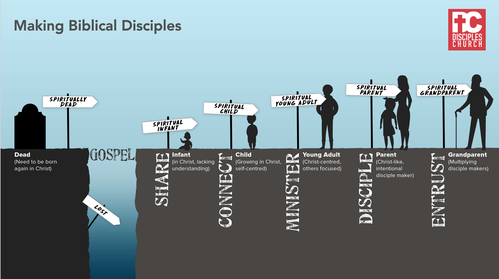We want to be looking after our brothers and sisters in Christ as we share life with them. To care for each other means that we should know each other well enough to be aware of each other’s needs, physically, emotionally and spiritually. This means actively pursuing genuine friendships within your group. Maybe someone is sick and needs a meal or some help with the housework. Maybe someone is doing it tough financially and people from your MCG could chip in to buy some groceries. Someone could be grieving and needs extra prayer and support. You might ask how God spoke to someone through the sermon or what he or she is reading in the Bible. We weep with those who weep and rejoice with those who are rejoicing. We bear one another’s burdens. In essence, you can take any of the ‘one another's’ we are instructed to live out in the New Testament and place it under the heading of ‘Care.’ We want these to be lived out within MCG families.
The most repeated of these is to love one another (Jn 13: 34, 15: 12, 17; Romans 13: 8; 1 Thessalonians 3: 12, 4: 9; 1 Peter 1: 22; 1 John 3: 11, 4: 7, 11; 2 John 5). Having this love for another is clear evidence to the world around us that we belong to Christ. You will find this easier to do with some people more than others. But regardless we need to love our people with a deep, genuine love!
Many of the other "one another" references can be grouped together into a few board categories - for example, unity and humility. If we seek to be gracious, forgiving, patience, kind, tender-hearted and accepting it will promote unity. If we try not to complain or grumble against each other but rather build one another up, spur each other on towards love and good deeds, confess our sins to each other, bear one another’s burdens, pray faithfully for each other and lovely speak the truths of Jesus to each then unity will and abound and our communities will flourish. For any of us to be able to do this it will require great humility and selflessness. This is another opportunity for us to model a growing Christlikeness - when we do this well it is clear; and when we don’t, we can model repentance and point our people to the only one who does it perfectly: Jesus.
What are some more practical ways to lead by example in this area? We need to set the tone by actively getting to know our group members, pursuing them relationally and facilitating opportunities for others to do the same. This is why regular social engagements are really helpful as they provide the chance for these kinds of friendships to be cultivated. We can’t expect that everyone will be able to come along to everything but all we can do is provide opportunities - and rather than be disappointed when numbers are low, we should see that as a chance to seek to go deeper with those few. When there are seasons where it is tricky to be connected face to face, for whatever reason, we can stay in touch by texts, phone calls, zooms etc.
Of course, there is always caring for practical needs - meals for sick, helping with practical tasks (mowing lawn, moving house etc), financial assistance where needed - just to name a few. And most importantly, remaining faithful in prayer for those you lead.


